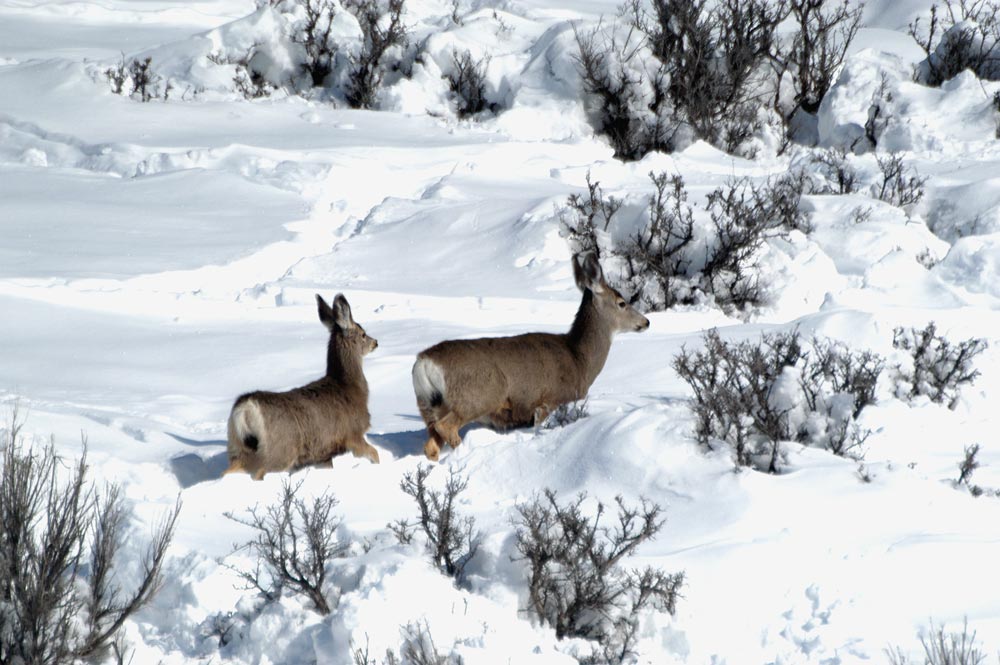After several mild winters in a row, this year’s winter above average precipitation and colder temperatures has felt a lot harsher for both people and wildlife. But while people can retreat to the warm comfort of a home, big game face the brunt of winter out in the elements as they have done for eons. As snowpacks build and frigid temperatures persist, Idaho Fish and Game starts fielding questions from concerned citizens about winter feeding of deer and elk.

“We are all concerned about the welfare of big game animals in challenging winter conditions, but the decision to feed or not to feed wildlife in winter is based on several criteria,” said Tom Curet, Fish and Game’s regional supervisor for the Salmon Region.
In order to implement a winter feeding program, Fish and Game must declare an emergency based on environmental and biological conditions, working in consultation with State-sanctioned regional Winter Feeding Advisory Committees. The Winter Feeding Advisory Committee for the Salmon Region includes five members from the Lemhi Valley, Salmon, Pahsimeroi Valley, and Stanley Basin representing landowner, sportsmen, and business interests. As local residents, advisory committee members are tuned in to local conditions and can provide timely information to Fish and Game if conditions change.
The advisory committee and Fish and Game utilize a number of guidelines to determine if and when to initiate an emergency winter feeding effort. These include actual or imminent threat of depredation to private property; threats to public safety, including traffic hazards; excessive mortality affecting the recovery of big game herds; and limited or unavailable winter forage caused by fire or unusual weather. Other important indicators are daytime temperatures, snow depth, and snow crusting (which requires animals to burn more energy to access forage and travel through snow). These three indicators are correlated to deer and elk body condition (measured from winter capture operations and field observations) to determine if feeding is necessary.
The winter feeding advisory committee met on January 22, 2017 in Challis to review emergency winter feeding criteria, current environmental indicators, and whether emergency criteria were being met. The advisory committee recommended that emergency winter feeding not be implemented at this time. While they acknowledged severe winter conditions in the Salmon Region met criteria for winter feeding, they also cited several factors that mitigated the need for emergency feeding of big game. Among these factors were the body condition of elk and deer entering the winter, environmental indicators within an acceptable range, and the current ability of Fish and Game to effectively address elk and deer depredation issues.
Fish and Game has responded to over 166 elk depredation complaints this winter throughout the Salmon Region. Remedies included providing assistance to landowners in the form of protecting/reinforcing stack yards and hazing elk from private property where practicable. Landowners and sportsmen have also harvested antlerless elk where depredations are occurring using a combination of landowner permission hunts, controlled extra elk tag hunts, and depredation hunts.
“We’ve found that preventative measures such as stack yard protection go a lot further than reactive measures to address elk damage,” said Greg Painter, Salmon Region Wildlife Manager.
The advisory committee also acknowledged problems associated with feeding big game. Importantly, winter feeding can disrupt natural winter migration patterns, concentrate elk and deer on or near private property where damage to crops and fences or collisions with vehicles may occur. Additionally, small to medium sized herds elk are distributed over such a wide geographical area that winter feeding would likely be infeasible to alleviate depredations. Department staff will continue to respond and work with landowners to alleviate depredations and the winter feeding advisory committee will continue to evaluate the need to initiate winter feeding as appropriate.
For more information about winter big game feeding, call the Salmon Region Fish and Game Office at 208-756-2271. Additional information about winter big game feeding can be found on the Fish and Game website at http://fishandgame.idaho.gov/cms/hunt/biggame/feed.cfm.
